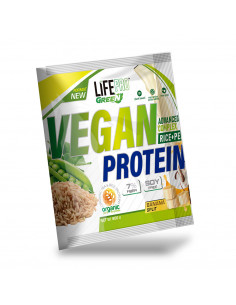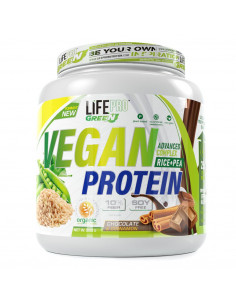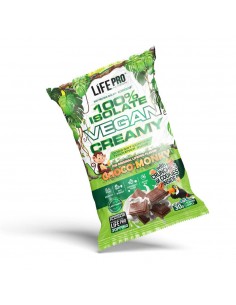Buy Vegetable Protein Online
Life Pro Vegetable Protein is a healthy alternative from plants such as soybeans, wheat and peas. Discover our selection of vegetable proteins, soy and oats, and our different flavors at the best price.
One of the most positive aspects of the great development that sports nutrition has undergone in recent years has to do with the inclusion of all types of people. In other words, the wide opening up of supplement companies' catalogues has increased the options available to such an extent that, whatever your personal characteristics, there is a product for you. Plant protein supplements are a good example, as they have made vegetarian and vegan diets compatible with sports nutrition.
This type of alternatives are ideal, as they make protein supplements available to vegan athletes, perhaps the most used category for its great positive properties for physical performance. At Life Pro we offer a wide variety of vegetable protein sources, such as rice, soy, pea or hemp, among others. In addition, we have different and very original flavours so that you never fall into monotony.
The benefits of vegetable protein sources
The appearance of vegetable protein powder supplements is great news for absolutely everyone who complements their sporting activity with products like these. While it is true that, as mentioned in the introduction, the main beneficiaries are vegetarian and vegan athletes, an important mention must be made of the role of plant-based proteins in our lives.
According to the World Health Organisation (WHO), the healthiest ratio when it comes to providing our bodies with protein is as follows: 75% should come from plant sources and 25% from animal sources. Thus, the fact that most protein supplements that existed a few years ago were of animal origin was not at all favourable.
One of the most basic explanations for this predominance of vegetable sources has to do with the composition of these proteins. In the case of animal proteins, their presence may be accompanied by fats that are not at all good for health, such as saturated fatty acids. However, when it comes to vegetable protein powders, the proportion of fats is usually lower and, if they are present, they are more likely to be of the unsaturated type.
The main objective of supplements with vegetable protein sources is to achieve an optimal number of amino acids in their composition, as these compounds - which are the ones that make up proteins - play a key role in maximising muscle performance. In fact, it is already possible to find in Life Pro plant products that are very rich in amino acids, so their properties are equal to or, in some cases, exceed those of animal proteins.
Vegetable protein and its ability to improve muscle performance
Protein supplements are one of the most important categories within any company operating in the sports nutrition sector, both in terms of volume of demand and the direct impact it has on physical performance.
In case you are just starting out in the world of supplementation and don't know whether you should give your body extra vegetable protein, we are going to give you a brief summary of the qualities of this famous macronutrient. Moreover, thanks to the enormous evolution of plant-based products, its benefits are fully comparable to those of other supplements of this type.
The first point to be made is that protein is an essential macronutrient, i.e., our body is unable to produce it on its own and needs an external supply. A balanced diet is sufficient to have a good level of protein in the body, but if you do sport, you may require a higher amount.
This specification in relation to physical activity is because one of the main functions of protein is to repair, regenerate and build muscle tissue. High-intensity training or competition can have a big impact on muscles, so extra protein will be very positive.
Specifically, we could divide its most important tasks into three: protect, nourish and recover. The first of these serves to prevent catabolic processes from degrading muscle fibres; the second allows muscles to work at a good pace, as well as facilitating their growth; and the third is key to making rest periods after intense effort more effective.
Which vegetables have more protein than meat?
Broccoli contains more protein per calorie than steak and, per calorie, spinach is about equal to chicken and fish. Of course, you will need to eat a lot more broccoli and spinach to get the same number of calories as meat.
How do you get protein from plants?
There are many ways to get protein from plants. Whole grains are a good source, and they are also complex carbohydrates. Try quinoa, barley, bulgur wheat, amaranth, millet, and brown and wild rice. Nuts, nut butters and seeds are another source of protein, and are rich in healthy unsaturated fats.
How can I get enough protein without eating meat?
There is no doubt that meat provides protein, but so do beans, eggs, nuts, yoghurt and even broccoli. The following non-meat foods contain plenty of protein: Nuts and seeds (4-10 grams per one-ounce serving): walnuts, cashews, pumpkin seeds, pistachios, sunflower seeds, almond butter, hemp, chia and flax seeds.
Category rating
(1233)






